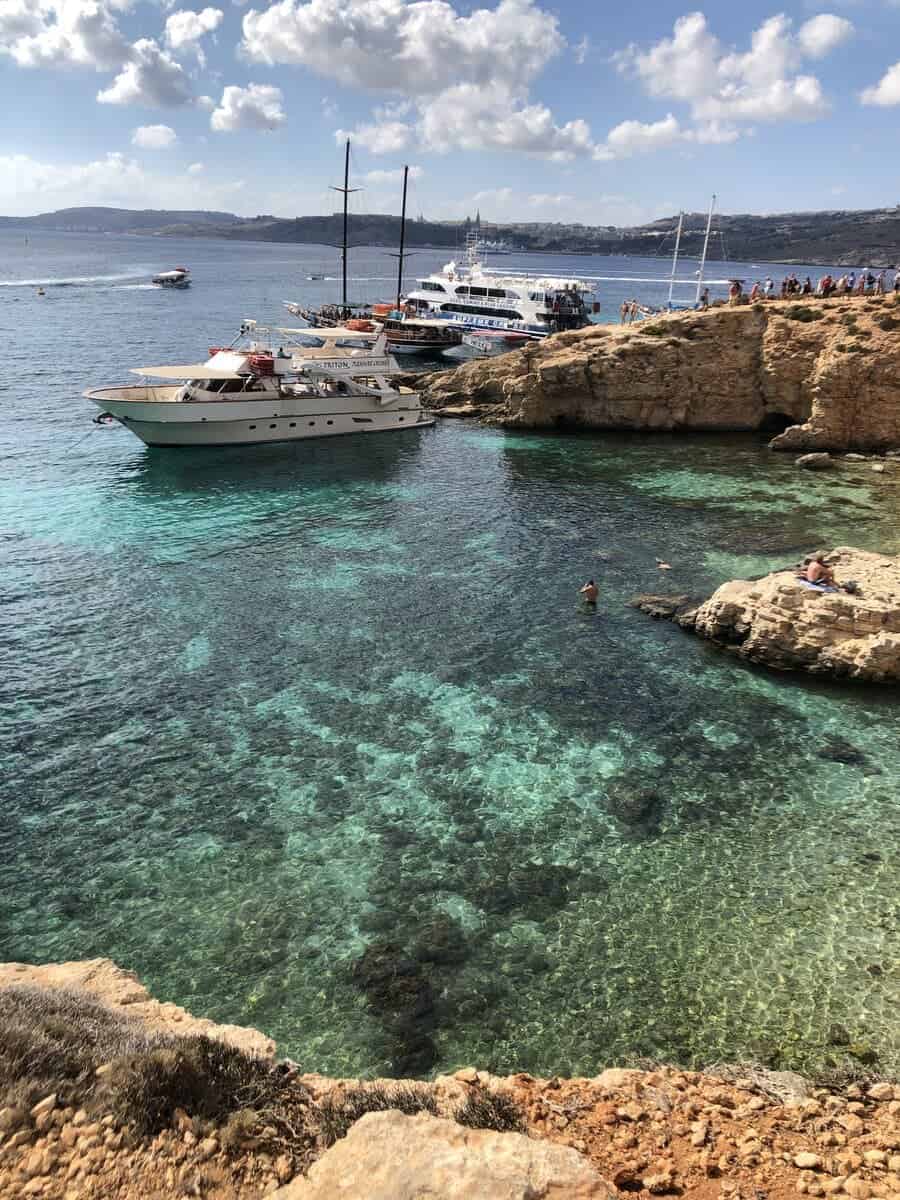A Solo Woman Traveling uses human-written content that contains affiliate links and is a member of Amazon Services LLC. When you make a purchase on a link, we may receive a small commission. This is at no extra cost to you. See Our Affiliate Policy and Advertiser Disclosure for more info.
If you’re planning a trip to the Greek Islands, you might be wondering which ferry company is the best to book. For years, I thought the answer was simple: find the cheapest option that gets you there the fastest. Easy, right?
But on my last trip to the Greek Islands in late June, I learned something important. Something that could completely make or break your trip.
It’s all about ferry reliability when the weather turns bad. And yes, even in summer, that can happen. I experienced this firsthand in June of 2025.
Most people assume that summer means smooth sailing, but the truth is, not all ferry companies are equal when it comes to running in rough seas.
Based on my experience, I can confidently say that one company stands out as the most reliable: Blue Star Ferries.
There’s definitely more to consider, and I’ll break it all down for you below. But if you’re just here for the quick answer to what’s the safest and most reliable ferry company, it’s Blue Star Ferries.
Just one quick note. Depending on which islands you’re visiting, Blue Star might not be an option. But if you’re heading to the most popular ones like Santorini, Mykonos, Naxos, Paros, Rhodes, or Crete, you’re in luck. Blue Star mostly covers the Cyclades, Dodecanese, and even some North Aegean islands.
If you want to double-check whether they go where you’re headed, you can see their full route map Blue Star Ferry Routes.
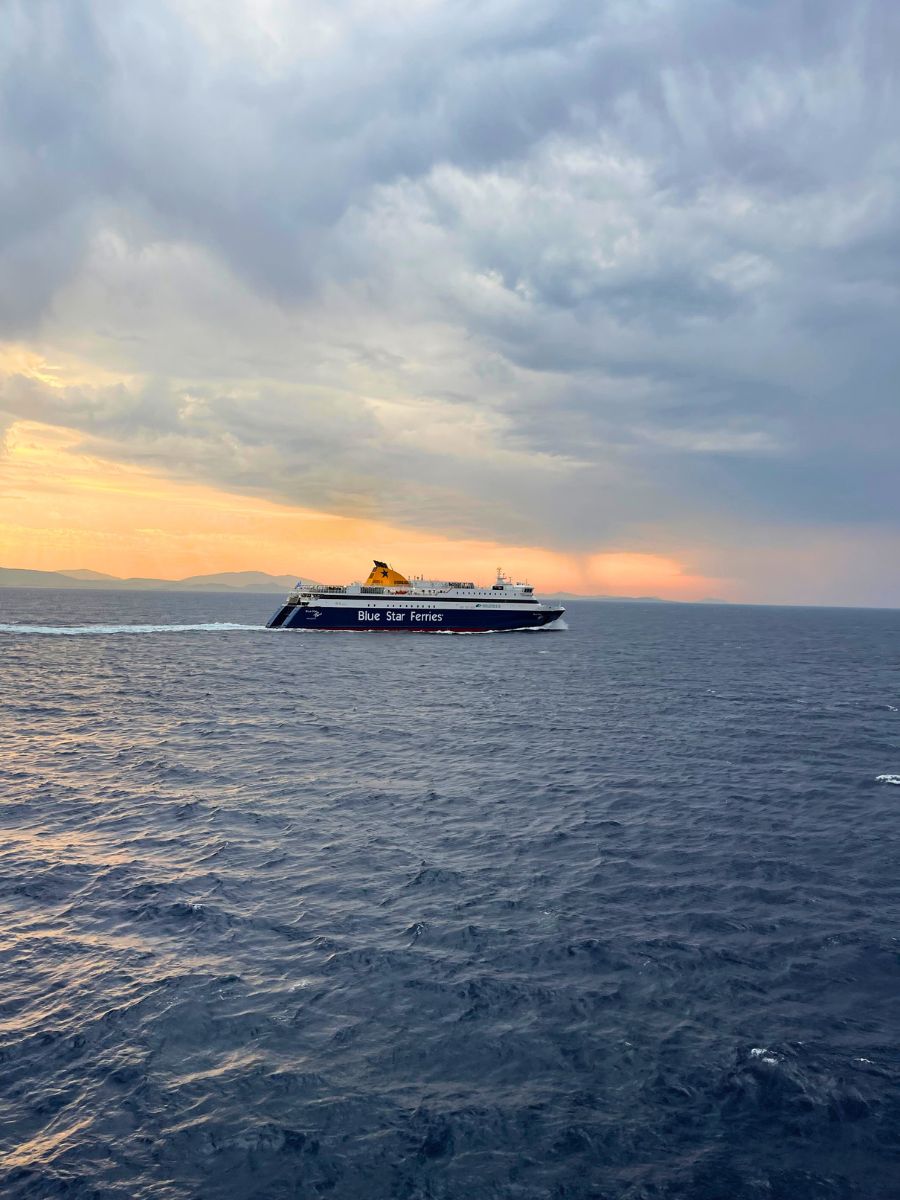
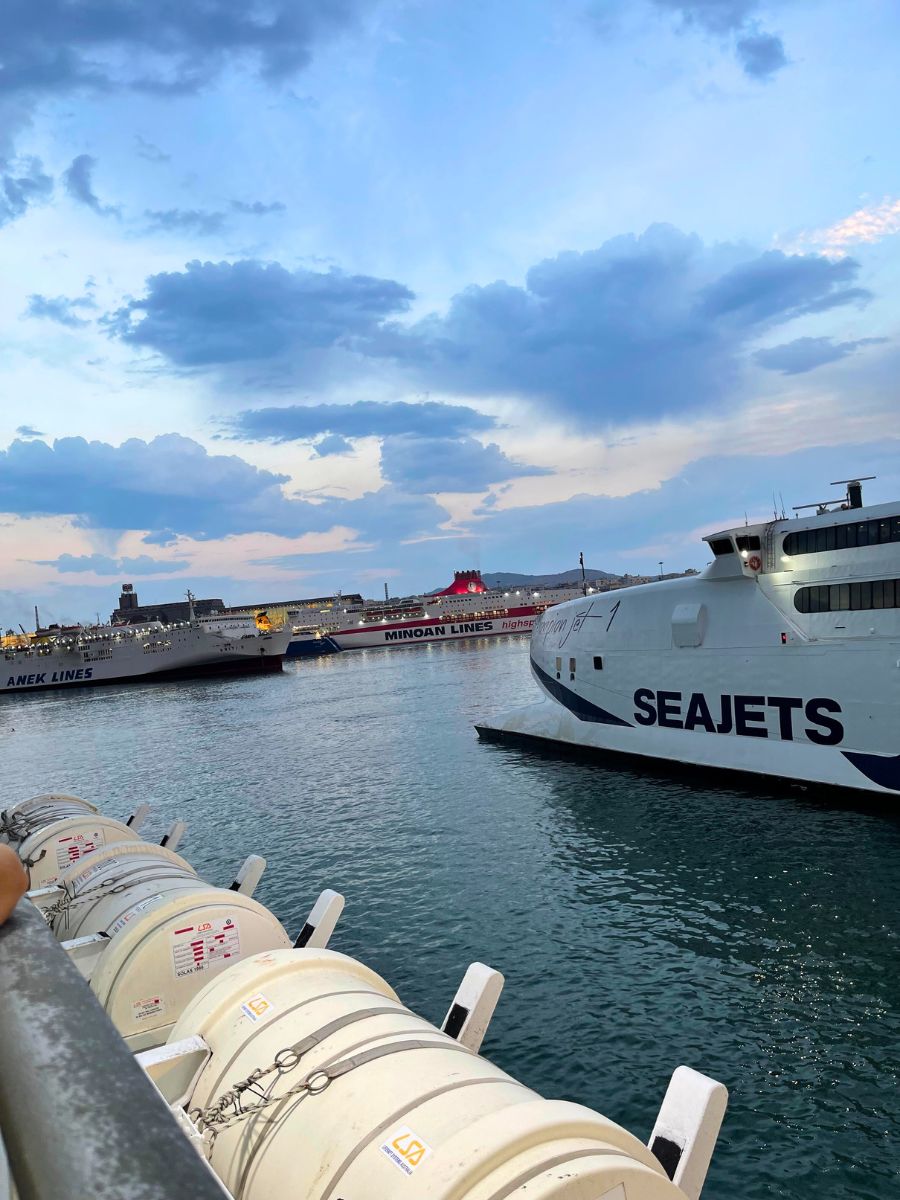
Need More Greece Resources? A Complete Travel Guide to Greece
How Does SeaJets Compare to Blue Star Ferries?
I’ll be honest, I am a big fan of SeaJets. Their ferries are sleek, fast, and often have great timing options. And you will notice that they have a lot of the routes if you are traveling within the Cyclades.
For a lot of routes, they’re the quickest way to get from island to island. They’re also usually more expensive, but I was always willing to pay a bit more to save time.
But is SeaJets a reliable choice? Not as reliable as I might have thought.
I never really considered that they might cancel completely. However, as I’ve experienced, when the weather takes a turn, SeaJets are usually the first to cancel their routes for their smaller vessels.
That’s exactly what happened to me. And when you’re depending on a ferry to get you to your next hotel, flight, or island, a last-minute cancellation can completely derail your plans.
So while SeaJets are great in perfect conditions, they’re not the company I’d rely on when the weather is even a little bit iffy. That said, I would highly recommend Sea Jets if there is no concern for a stormy day.
I find the ships to be more comfortable and they hold fewer people than Blue Star Ferries, so it’s not as of a madhouse when boarding and deboarding the ship.
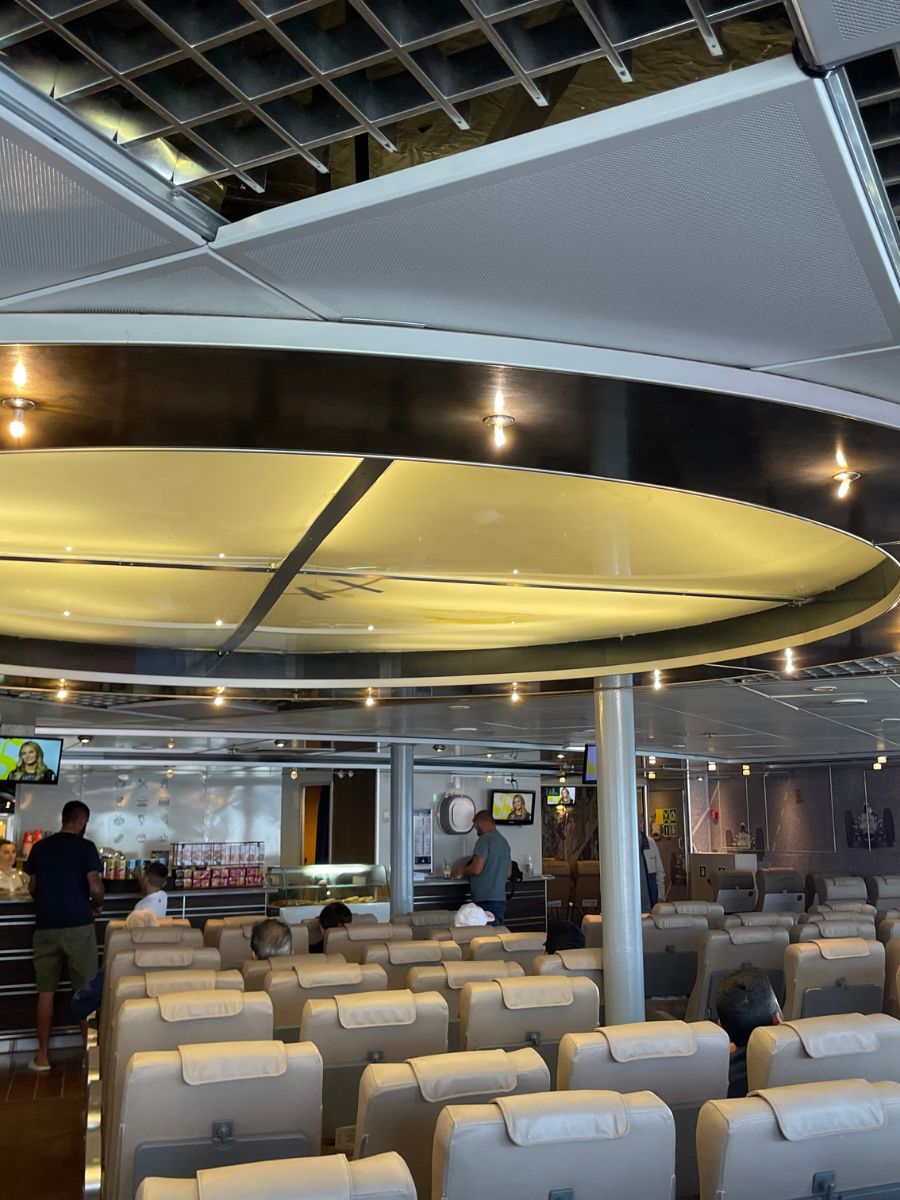
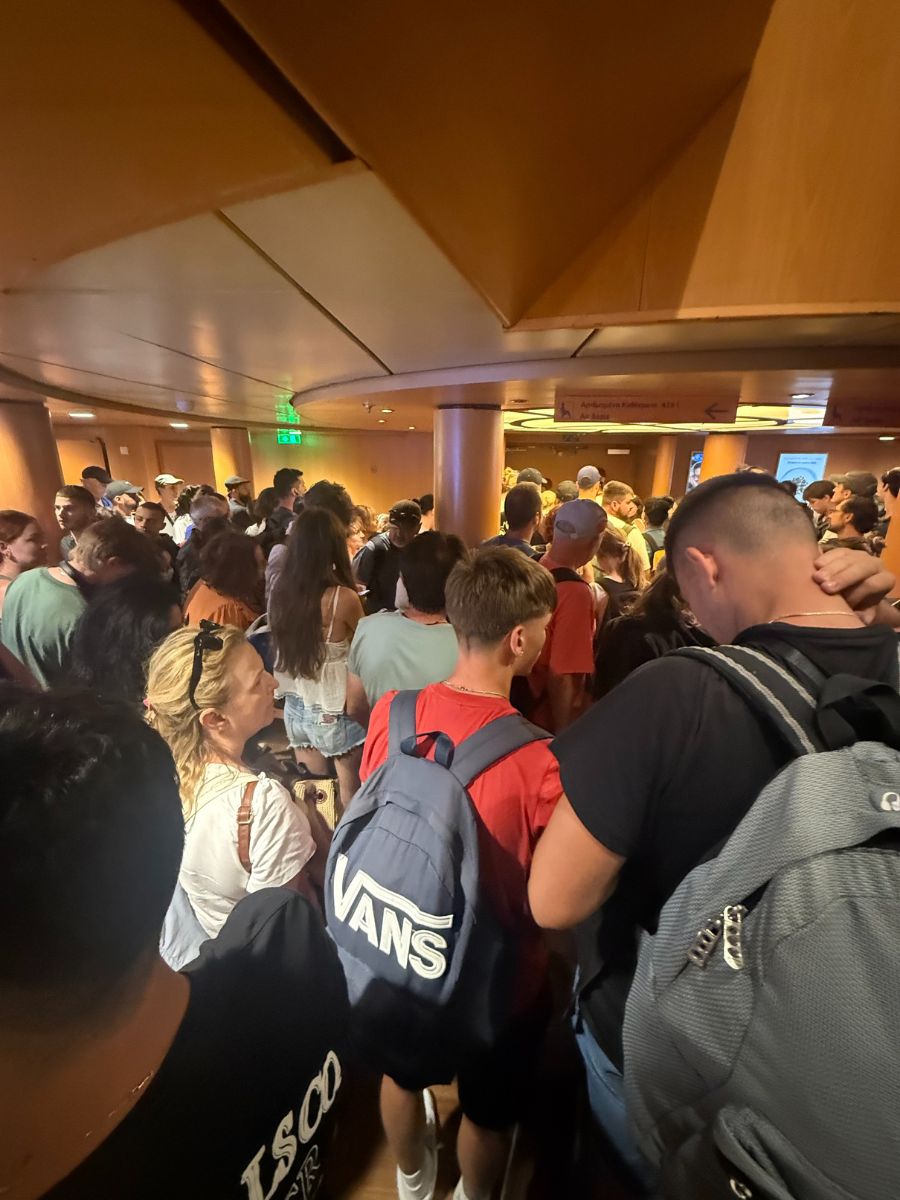
When Is the Weather the Most Volatile in the Greek Islands?
Let’s talk about this in the context of when people are actually visiting the Greek Islands. Most travelers go between May and early October, which makes sense because that’s when the islands are fully open. Outside of that window, a lot of places shut down. By mid-October, many hotels, restaurants, and ferry routes stop running, and they don’t really come back to life until around May.
So, when we say “bad weather,” we’re really talking about within that travel season.
The most unpredictable time, weather-wise, is usually July through early September. That’s when the Meltemi winds kick in. The Meltemi winds are strong, dry winds that can make the sea rough and ferries a bit of a gamble, especially the smaller high-speed ones like SeaJets.
If you want to play it safer, look at traveling in late May, early June, or late September. The weather is usually calm, the water is still warm, and the crowds aren’t as intense. Plus, ferries are less likely to be canceled.
Of course, weather is weather, and surprises can still happen. But if you’re trying to avoid the “ferry may not leave today” situation, that’s your best bet.
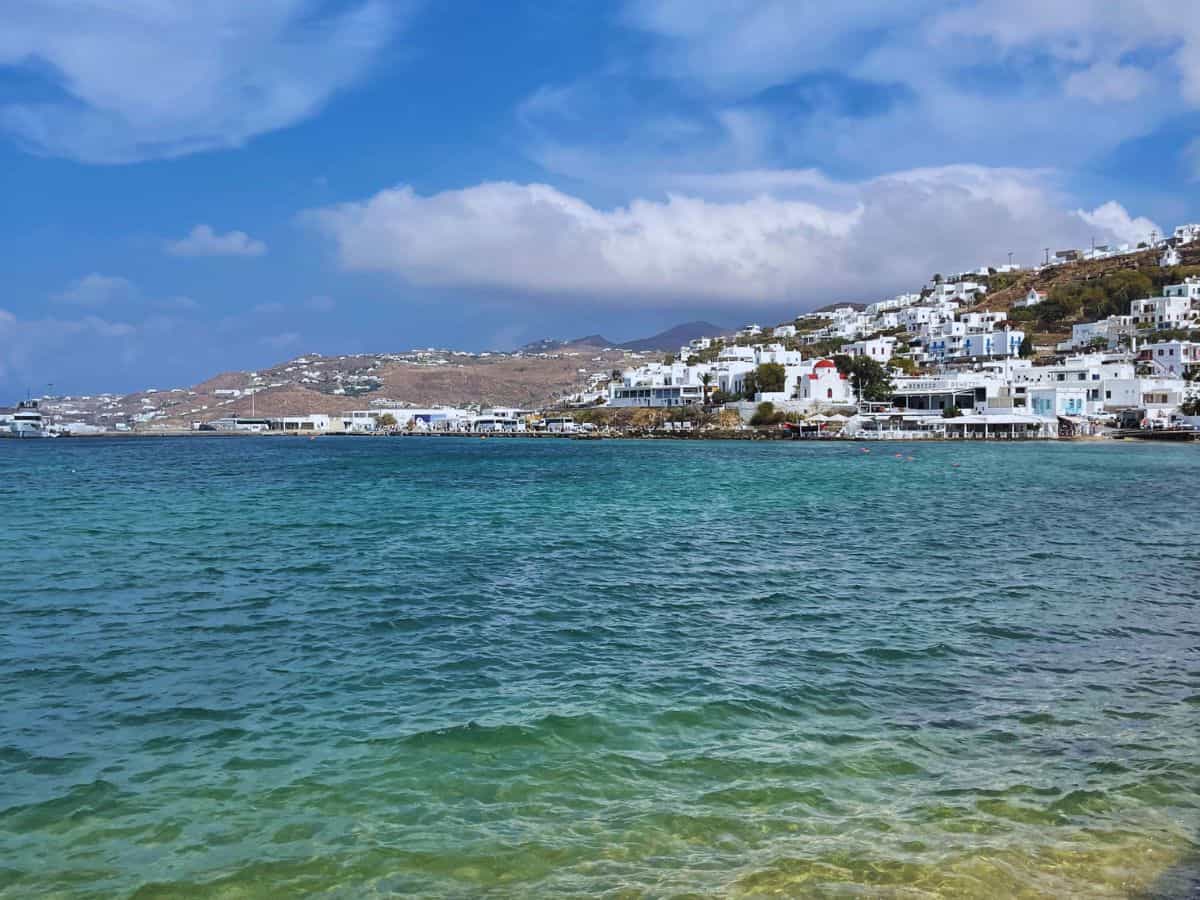
How Much Does It Cost to Change Ferries in Greece?
When it comes to getting a refund, don’t worry if your ferry is officially canceled due to weather; you will get a refund no matter which company you booked with.
But what happens when you want to change plans before the ferry company makes the call?
Let me tell you about my experience. I had booked with SeaJets on a day with bad weather forecast. I wanted to switch to Blue Star Ferries because I knew they had a better chance of actually sailing.
However, because SeaJets hadn’t officially canceled yet, I was still liable for a 50 percent cancellation fee.
Unless you added the extra coverage, like the optional insurance when purchasing, you’re basically out of luck if you want to be proactive and switch ferries. And that fee stings.
So if you’re booking during a time of year when weather could be an issue, or if your plans are a bit loose, it really helps to know the policies before you book.
Here’s a quick breakdown of how cancellation fees work for both SeaJets and Blue Star Ferries.
| Ferry & Ticket Type | Full Refund | Partial Refund | Non-Refundable |
|---|---|---|---|
| Blue Star – Refundable | ✅ 7+ days out | ❌ within 12 hrs = 50% refund | ❌ after departure |
| Blue Star – Convertible Open-Date | ✅ sometimes | ✔ according to conversion window | ❌ once converted |
| SeaJets – Refundable | ✅ 14+ days out | ✔ sliding scale | ❌ under 12 hrs |
| SeaJets – Open-Date | ✔ up to conversion time | ❌ afterward | ❌=# |
| Both – Discounted/Super Economy | ✖ none | ✖ none | ✖ none |
Should You Book Direct or Use a Site Like Ferryhopper?
Another question I answer a lot is whether it’s better to book directly or through a third-party company like Ferry Hopper. Personally, Ferry Hopper is my go-to site.
Ferryhopper makes planning super easy. You can compare routes, ferry companies, and prices all in one place.
The interface is clean, booking is quick, and you get instant e-tickets, plus there is an app with live tracking on your ferry position (although the tracking can be off a little). It’s especially helpful if you’re planning multiple island hops or want to keep your options open.
One thing to consider, though, is what happens if something goes wrong. If your ferry is canceled or plans change, you’ll need to work with Ferryhopper’s support team, not the ferry company itself. That usually works fine, but it can mean a little extra back and forth.
Unless you book with Ferryhopper’s extra cancellation insurance. This add-on gives you more flexibility, including the ability to cancel up to 4 hours before departure and even switch ferry companies without any extra fees. If your plans are a bit loose or you’re traveling during unpredictable weather, that extra bit of coverage can really come in handy.
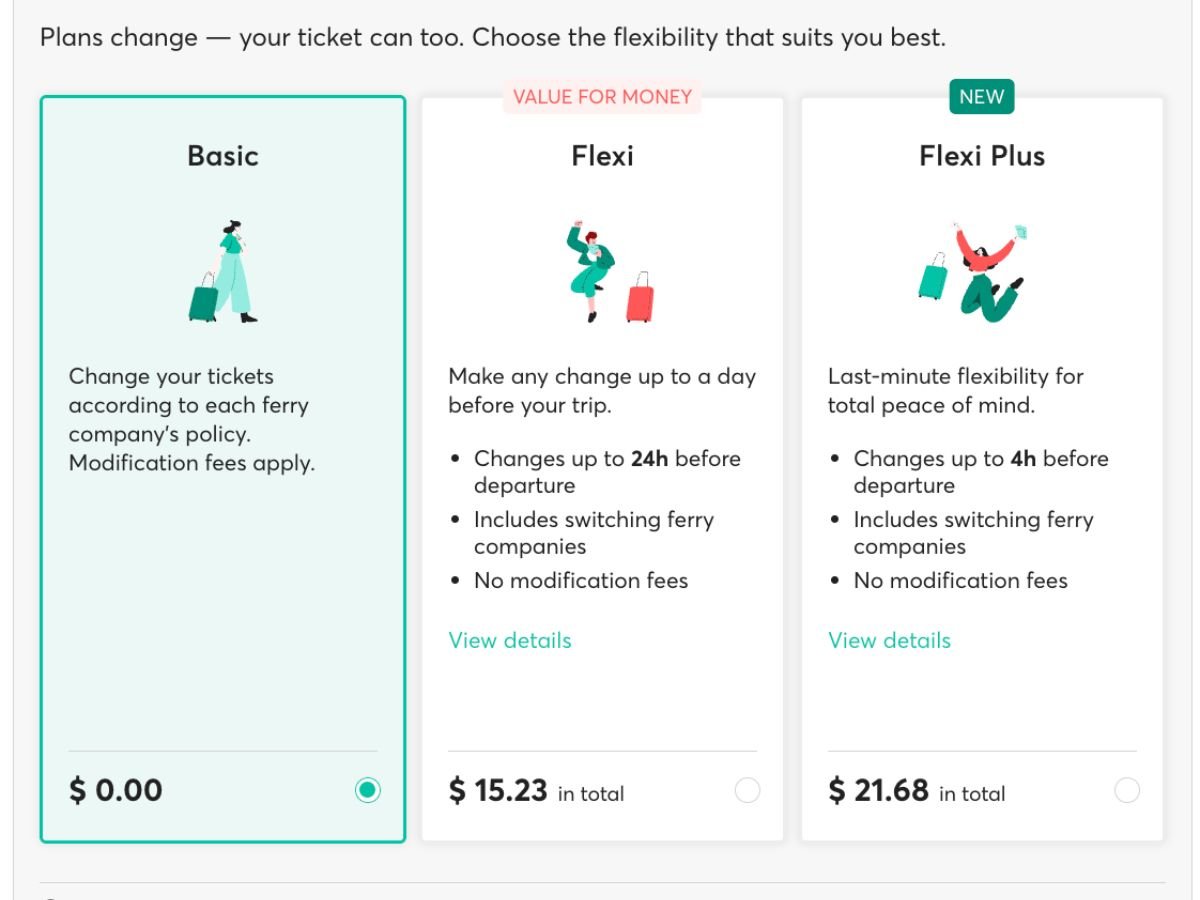
Booking directly with Blue Star or SeaJets might give you more direct control for changes or rebooking, but I’ve personally never had an issue using Ferryhopper and appreciate how convenient it is.
In the end, I say, if you want convenience and flexibility, book through Ferryhopper and get the insurance.
If you’re traveling during peak times or feel more comfortable dealing directly with the ferry company, booking directly can also work just fine.
READ MORE: Best Travel Apps for Greece
Real-Life Ferry Mistakes to Avoid in Greece
Tip: Check what your ferry actually looks like before boarding.
This is a little embarrassing to admit as someone who travels professionally, but this summer I accidentally got on the wrong ferry. Yes, it really happened.
You might think someone would check your ticket before you get on board. In my case, they didn’t. Not until we had already started sailing.
The tricky part was that the ferry I boarded was going to the same island I was headed to, just a different port. Technically not a disaster, but definitely not ideal.
If I had looked up a photo of the ferry I was supposed to take, I would have known right away that I was getting on the wrong one.
Most booking sites, such as Ferryhopper, will provide you with the name of the vessel. A quick image search before you go can save you a lot of stress.
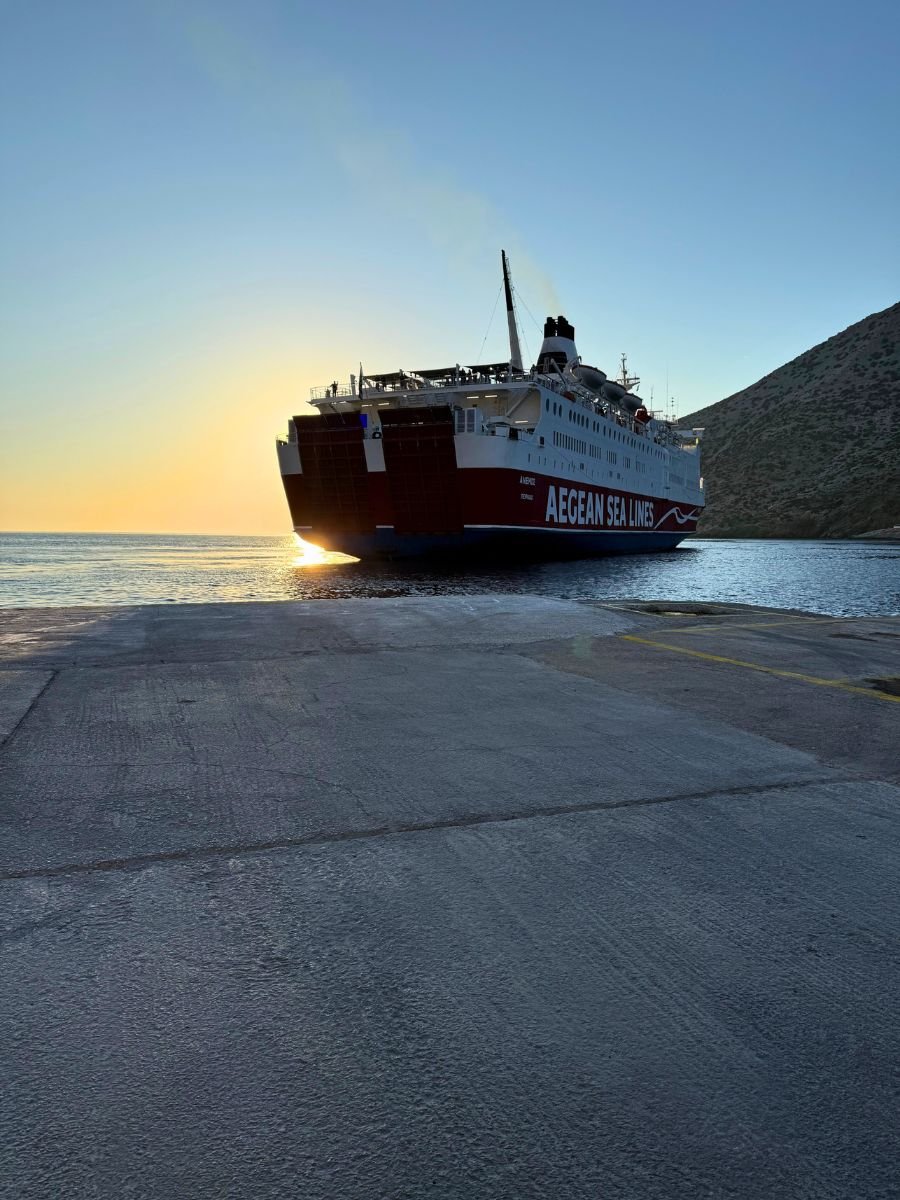
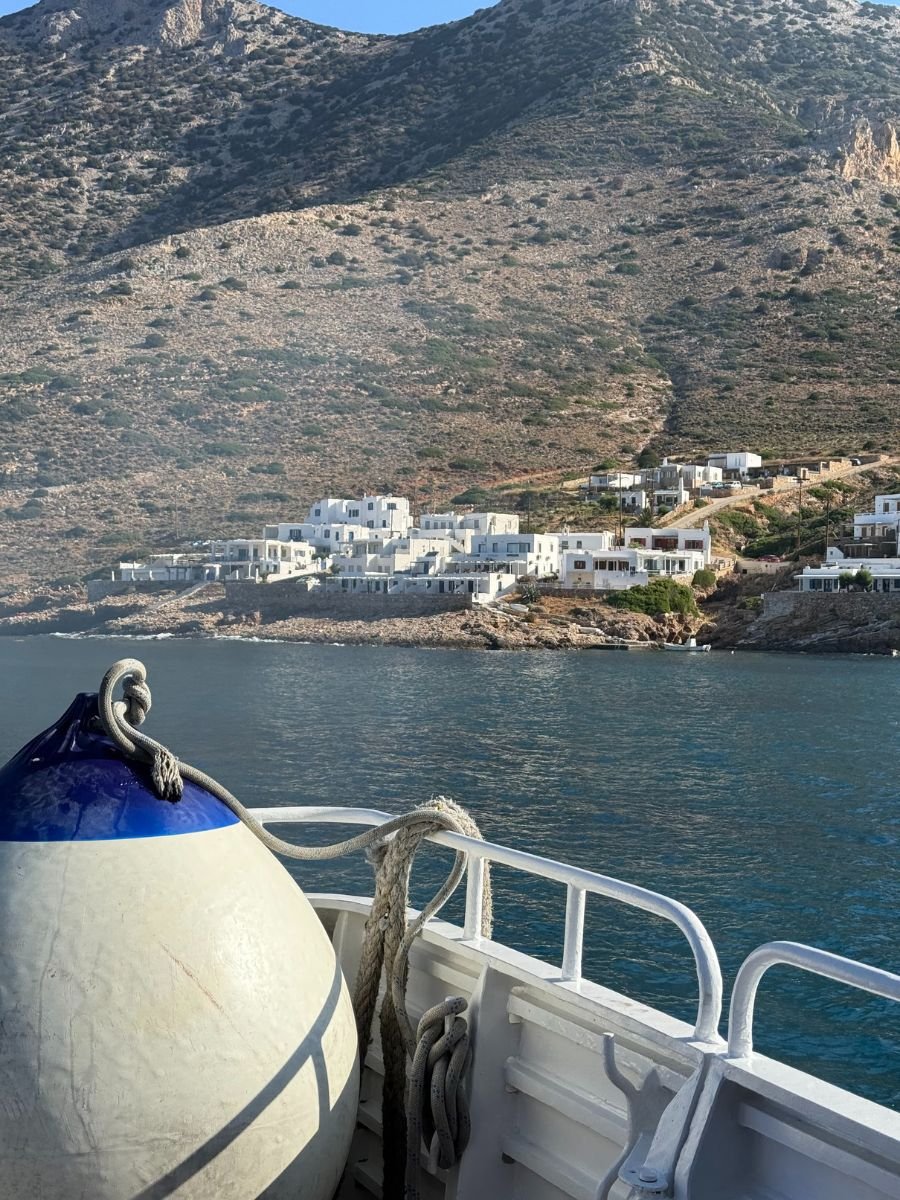
Tip: Always book a pickup in advance when arriving at the Port of Piraeus.
Piraeus is one of the busiest ports in Europe, and when multiple ferries arrive around the same time, it can feel like total chaos. Thousands of people pour off those ships, and trying to grab a taxi on the spot is nearly impossible.
I highly recommend booking a pickup in advance. I always use Welcome Pickups, and it makes a huge difference.
Your driver texts you when they arrive, tracks your ferry, and helps you get out of the madness quickly. It takes all the stress out of figuring out transport when you’re tired, hot, and just want to get to your hotel.
Tip: Insure your trip. It’s absolutely worth it.
Travel insurance is surprisingly affordable, and when you’re visiting the Greek Islands, it can really save you if something goes wrong. Ferries get delayed or canceled more often than you’d expect, especially with unpredictable weather.
Make sure your policy includes trip interruption coverage. This can help if your ferry gets canceled and you need to book an extra hotel night, catch a new flight, or miss a prepaid activity. Not all policies are the same, so it’s worth reading the fine print and knowing what’s actually covered.
I personally use Faye Travel Insurance for all my trips now. Their site is easy to use, the coverage is clear, and their customer service has been great anytime I’ve needed it.
Tip: Book your ferry tickets in advance during the summer months.
In June 2025, I saw something I’ve never seen before: ferry routes were completely sold out. With the steady rise in tourism to the Greek Islands, this is becoming more common, especially in peak season.
If you’re traveling in June, July, or August, I recommend booking your tickets at least 60 days in advance to get your preferred route and time. You don’t want to be stuck with a ferry that doesn’t fit your schedule or, worse, no ferry at all.
If you’re traveling during the shoulder months, like May or September, you’ll usually have more flexibility and less need to book far in advance. But for high summer, plan ahead.
Final Breakdown: What’s the Best Ferry to Book?
Here’s my most honest advice. If you’re traveling with no flexibility and want the closest thing to a guaranteed departure, even in bad weather, then Blue Star Ferries is your best bet.
You can also look at Anek Lines, especially if you’re going to Crete (Chania or Heraklion) from Piraeus, or traveling on certain Dodecanese and Cycladic routes. Both companies use large, conventional ferries that are more likely to run when conditions aren’t ideal.
If you have a bit more flexibility and want to prioritize speed, SeaJets is a great option. Their ferries are fast and modern, and perfect for island-hopping. Just keep in mind they are the most expensive and are usually the first to cancel when the weather turns.
I highly recommend getting travel insurance. At the very least, book your ferry tickets with the flexible cancellation option some booking sites offer. That gives you the ability to make changes without losing half your money like I did.
Have more questions? I’m happy to help!
Please use this contact form, and I’ll be in touch.
I’m also a registered travel agent, and would be happy to create a customized itinerary. Just fill out the form, and I’ll take it from there.
Travel Resources for Greece
- Solo Trips to Greece
- Greece Travel Guide
- Ultimate Greece Travel Guide
- 15 Best Greek Islands For Solo Travel
- 9 Best Greek Islands for Foodies & Wine Lovers + Map
- Solo Female Packing List For Greece: Summer & Winter
- The Best Private Airport Transfer From Athens Airport
- Affordable Greek Islands Near Mykonos
- Best & Hottest Greek Islands to Visit in May
- Should You Rent a Car on the Greek Islands?
- Most Reliable Ferry Company For Greek Island Hopping
- Cyclades Islands or Sporades Islands? How to Choose!
Alonissos
Athens
- What To See In 2 Days In Athens Itinerary + Map
- What to Expect Visiting Athens in November
- Is Athens Worth Visiting? Should You Go or Skip It?
- What to Expect When Visiting Athens in December
- 10 Best Athens Hotels With Rooftop Pools
- How To Visit Athens On A Budget + Free Calculator
- 7 Easy Day Trips From Athens City Center
- Best Half-Day Tour: Athens To Temple Of Poseidon
- Coco-Mat Athens BC Hotel Review
- The Best Ferry From Athens To Hydra Island in
- Ultimate Athens Solo Travel Guide + Free Map
- Easy Greek Words and Phrases to Learn for Travel
- Is Your Name Greek? Greek Names Generator & Meanings
- 18 Pros & Cons of Living in Athens Greece by an Expat
- Best Cafes in Athens by Neighborhood
Crete Island
Folegandros
Hydra
Koufonisia
Milos Island
- All The Best Things to Do in Milos By Area + Map
- Renting a Car in Milos: What You Need To Know
- The Perfect 4 Days in Milos Itinerary Guide + Map
- 12 Best Boutique Hotels In Milos Greece in
- A Private Luxury Boat Tour to Kleftiko Milos
- Best Milos to Athens Ferry Travel Guide
- Sifnos vs Milos: Which Island is Better
Mykonos
- Ultimate Solo Travel Guide Mykonos
- Is Mykonos Expensive?
- How to Get Around in Mykonos
- Day Trips From Mykonos
Naxos
- Renting a Car in Naxos: Exploring the Pros and Cons
- Best Naxos Bus Tour Highlights of Idyllic Villages
- 10 Best Villages to Visit in Naxos
Sifnos Island
- Best Guide to Sifnos Greece: Everything To Do + Map
- A Guide to Booking a Ferry From Athens To Sifnos
- Flight From Athens to Sifnos By Private Helicopter
- Honest Review of Nival Boutique Hotel in Sifnos
- Best Beaches in Sifnos, Greece
- Sifnos or Serifos: Which Island is Better?
- Milos or Sifnos: Which Island is Better?
- Sifnos or Syros: A True Comparison
Serifos Island
- Complete Island Guide To Serifos Greece + Map
- Which is Better: Sifnos vs Serifos?
- Serifos or Folegandros: Which Island is Better?
Skiathos & Skopelos
Skopelos or Skiathos, Which Greek Island is Better?






